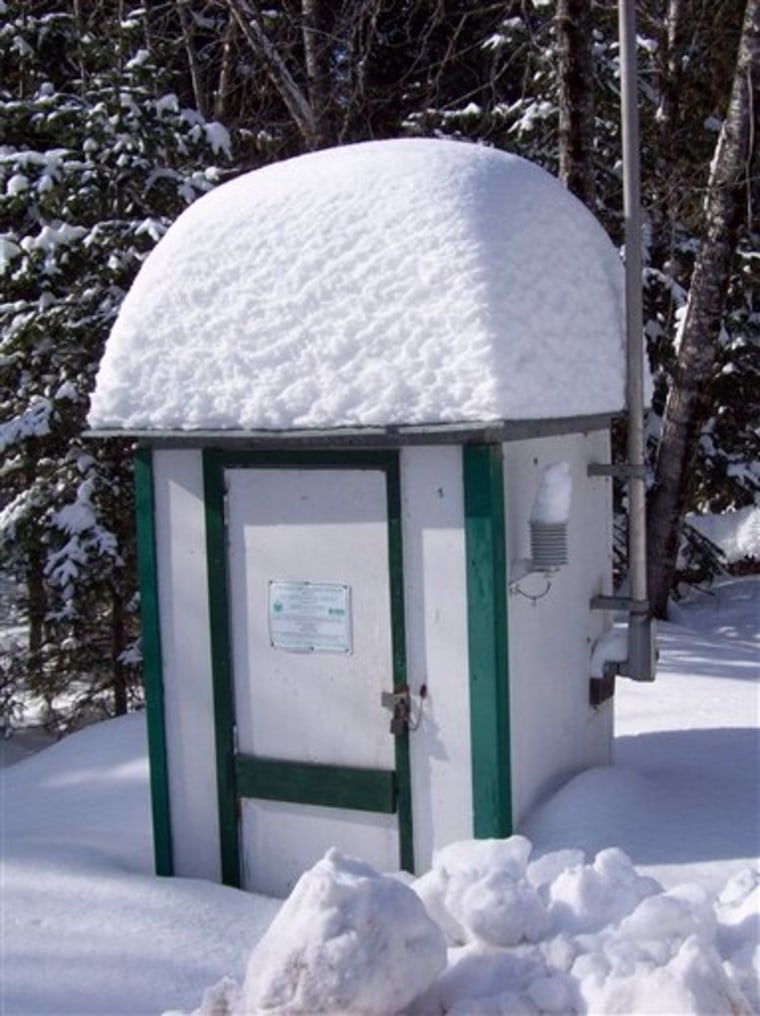Teeth are chattering in New England, where scientists just spent about a month scrutinizing weather data before proclaiming that, yes, Maine has pulled even with Vermont in bragging rights for the region's lowest recorded temperature — 50 below.
That's wicked cold, as a New Englander might say, the breath freezing in a puff on the first syllable. But even though it's far from the chilliest the nation has ever seen, the attention to detail in declaring the tie — and not really the temperature itself — might show how deeply we feel about the weather.
"The general public, meteorologists and the media ... we're fascinated with extremes, whether it be with extreme snowfall, or how much rain fell, or in this case, how cold did it get," said Hendricus Lulofs, chief meteorologist at the National Weather Service bureau in Caribou. "It's the fascination of achieving something, or maybe having measured something that at least in modern times has never been measured before."
The frigid Fahrenheit reading was recorded about 7:15 a.m. Jan. 16 at a remote data-collecting station in Big Black River, about four miles from the Canadian border. It ties the record set in 1933 in Bloomfield, Vt., for New England's lowest temperature in roughly a century of record-keeping, and reflects the actual air temperature, not the wind chill factor.
But weather experts don't award temperature extremes willy-nilly.
The National Weather Service's first report of what appeared to be a new record low activated a group called the State Climate Extreme Committee, whose members represent state and federal weather agencies. They examined all data pertaining to the reading and called for a testing of the thermistor, an electrical device used in measuring temperatures.
By chance, a monitoring crew that been at the site 10 days before the minus-50 reading checked the device and found it in perfect working order. But before any final decisions were made, a device just like the one at Big Black River had to be tested at 50 below, and it, too, turned out to be on the mark.
"It turned out it was spot on," said Bob Lent, Maine director of the U.S. Geological Survey, which shares its monitoring sites with the National Oceanic and Atmospheric Administration.
Voting and a final call
A vote was taken by the State Climate Extreme Committee, and the final call was made by the National Climatic Data Center, based in Asheville, N.C.
Maine's new record beats the old 48-below mark set in 1925 in Van Buren, also in the northern part of the state. The Jan. 16 low came as part of a blast of arctic air that swept across the state, leaving many other spots in the state shivering in temperatures that were in the double digits below zero.
The record on New Hampshire's Mount Washington, known for its wild weather extremes, is "only" 47 below.
-129 in Antarctica is coldest
While Mainers may be proud to bolster their hearty reputation with the new who-can-survive-this temperature, the minus-50 is nothing like what other parts of the continent, not to mention the world, have seen.
The lowest temperature in North America — 81 below — was recorded on Feb. 3, 1947, at Snag, Yukon Territory in Canada. In the United States, the coldest reading was minus 80 at Prospect Creek, Alaska, on Jan. 23, 1971. And in the lower 48, the all-time cold spot is Rogers Pass, Mont., where it was minus 70 on Jan. 20, 1954, according to NOAA records.
The lowest natural temperature ever recorded on Earth was 129 below at the Russian Vostok Station in Antarctica on July 21, 1983.
Now, that's wicked cold.
